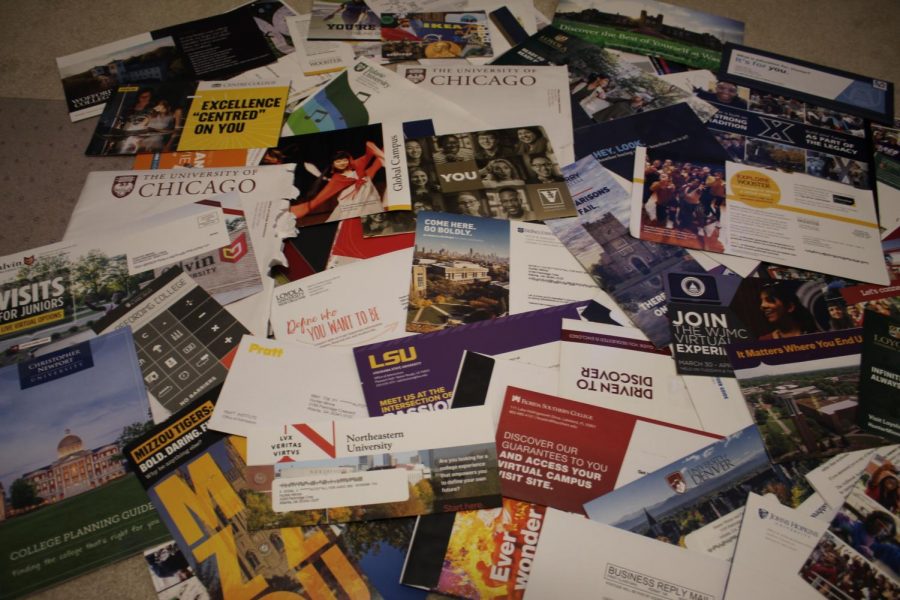Colleges spam students with emails
May 10, 2021
Arguably one of, if not the, biggest part of junior year is beginning the college search. Juniors meet with their counselor throughout the year to discuss possible majors and careers, and then hopefully start narrowing down their selection of colleges to just a handful of specific schools. Some students go on college tours, some students prepare for the SAT or ACT, and almost all juniors begin receiving a massive influx of emails and mail from all sorts of different colleges around the country.
Juniors will start receiving college emails after either taking the PSAT or the SAT, as the emails begin after the colleges get their names. This is done through the College Board who at the end of their standardized tests, specifically the PSAT and SAT, have an option that students can fill out called the Student Search Service. College Board describes this service as something that “helps colleges and scholarship programs send you more relevant communications so you can find the school that’s right for you.”
College emails sound great when you say it like that, but junior Joshua Bartholomai has a different way of describing them.
“College emails are just a scam to get more people to apply so they can reject more people and lower their acceptance rates,” Bartholomai said.
Students who fill in the bubble for the Student Search Service are hoping that by doing so they will be contacted by schools that are genuinely interested in them and that they are genuinely interested in as well. Unfortunately, as College Board charges colleges a licensing fee to access that student’s information, they are inclined to sell them out to as many colleges as possible.
When junior Ana Pichanik first started getting college emails she was understandably excited to see that some different schools were interested in her, but when the tidal wave of emails eventually rolled in she was also understandably disappointed.
“I thought it was kind of cool that they were actually considering me and sending me an email, and it felt kind of cool,” she said. “But after so many emails and my friends getting the exact same ones, I was like these are just mass emails it doesn’t seem like there’s a big point to them.”
This feeling that college emails don’t really have a purpose is fairly common, especially since many students receive emails that are unrelated to their interests.
“I’ve actually gotten a lot from military academies like West Point and Virginia Military Institute,” Pichanik said. “Which is kind of intense and definitely not what I want to do.”
Junior Will Montello has had a similar experience.
“Because there’s no way to specify what you want or what colleges you want to hear from, it’s just a never-ending flow. I’m getting ones from medical colleges and I’m like I’m not going into medical,” Montello said.
Interestingly, it looks like the same group of colleges and universities are the ones who send the most emails.
“Tulane definitely sends a lot, but I did end up unsubscribing successfully from those,” Montello said.
“Tulane, Rochester, I got some from Harvard, but I’m like, Harvard is not looking, just sending them out,” Bartholomai said.
“I get a lot from Wofford. I used to get a lot from Tulane, some from Xavier, yeah so many from Tulane,” Pichanik said.
If nothing else is clear, it seems safe to assume that Tulane University is a big fan of St. Pius X students.
Whether or not responding to these emails actually helps with getting into the school that sent them is up for debate. Some, like Bartholomai, think there is no point in responding to these emails as the colleges only send them to boost the number of applicants they receive so they can lower their percentage acceptance rate. Others, like Pichanik, are more hopeful.
“If there’s a college that sends me an email that I’m actually interested in then I’ll click on one of their links to go to their website and ‘confirm your interest,’ because I want them to send me relevant information and things like that. But the ones that I haven’t heard about or I’m not really interested in I just kind of let it be,” she said.
Conversely, Montello wishes that there was an easier method of stopping the emails besides blocking each individual one.
“There should be an option on the SAT or wherever they’re getting it from to just be able to just say hey check this if you want to receive any emails, or if you want to receive emails just about schools in your region, or colleges that are specifically for your major. Instead of just having garbage spam of never-ending emails,” Montello said.
Until there is a change in how the College Board runs their Student Search Service, Montello will have to continue stopping the emails the old-fashioned way.
“I have ripped up every single piece of mail and I have deleted every email,” he said.
So far this method has worked well enough for Montello and many other juniors, but what chance do they have against the next torrent of Tulane telecommunications?






